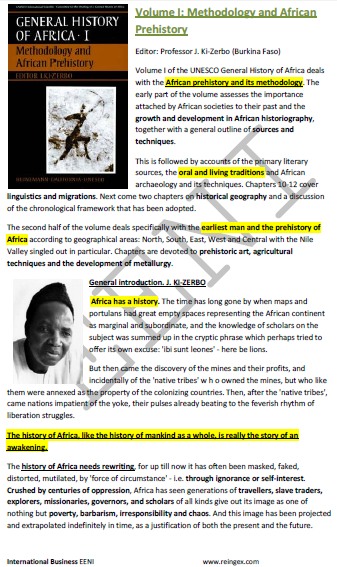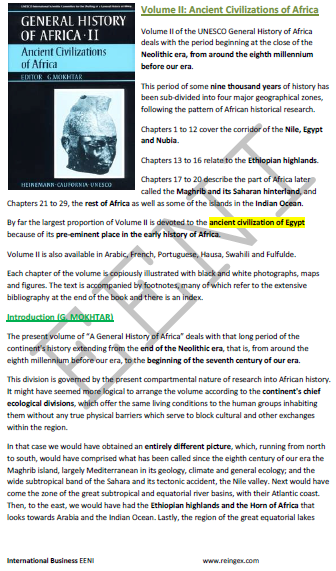History of Africa, Slavery, Colonialism

African Prehistory, Colonialism, Independence (History of Africa)
- Introduction to the UNESCO General History of Africa
- Methodology and African Prehistory (Volume I)
- Ancient African Civilizations (Volume II)
- Africa from 7th to 11th century (Volume III)
- Africa from 12th to 16th Century (Volume IV)
- Africa from 16th to 18th Century (Volume V)
- Africa in the 19th century until 1880 - Abolition of Slavery- (Volume VI)
- Africa under Colonial Domination, 1880-1935 (Volume VII)
- Africa since 1935. Independence of the African Countries (Volume VIII)
- Phase II of the General History of Africa. Sankofa
- Authors of the UNESCO General History of Africa
- African Historians
The objectives of the subject “History of Africa” are the following:
- To understand the role of Africa in the history of humanity
- To study the evolution of the African history
- To understand the fundamental concept of the oral traditions in Africa
- To analyze the foundations of the African Traditional Religions
- To know the African empires and kingdoms
- To understand the impact of the Islamic Civilization on Africa (Islamization, slave trade, trade routes...)
- To understand the impact of the Western-Christian Civilization on Africa (Christianization, transatlantic slave trade, abolitionism, colonization, independence...)
- To analyze the African Diaspora in America
Three millions of years of the African History. African contribution to humanity.

The Subject “UNESCO General History of Africa” belongs to the following Online Programs taught by EENI Global Business School:
Doctorate in African Business.
Languages:  or
or  Histoire Afrique
Histoire Afrique  Historia Africa
Historia Africa  Historia Africa.
Historia Africa.
- Credits of the Subject “History of Africa”: 4

- Duration: 4 weeks
- Download the syllabus: “History of Africa” (PDF)

UNESCO General History of Africa

- Eight volumes
- Each volume: thirty chapters
- President of the International Scientific Committee of the General History of Africa: Bethwell Allan Ogot
- African authors (Sheikh Anta Diop, Théophile Obenga, Joseph Ki-Zerbo, Ahmadou Hampaté Bá, Boubou Hama, Elikia M'Bokolo, Hichem Djaït, Pathé Diagne, Akin Mabogunje, Ali Al'amin Mazrui, Christophe Wondji, Jacob Festus Adeniyi Ajayi, Albert Adu Boahen Kwadwo, Djibril Tamsir Niane...) and non-Africans
- Translations of the General History of Africa: French, English, Portuguese, Arabic, Kiswahili, Hausa, and Spanish
- Historic inter-African relations
- African contribution to the development of humanity
- Huge diversity of sources
- Recognition of the African Cultural Heritage

(c) EENI Global Business School (1995-2024)
We do not use cookies
Top of this page



